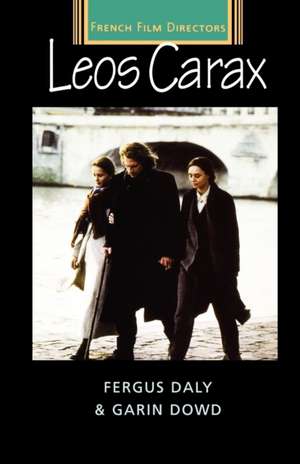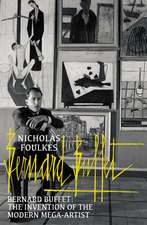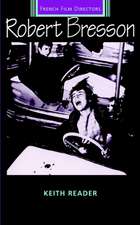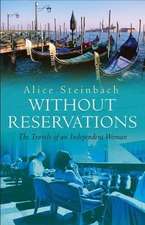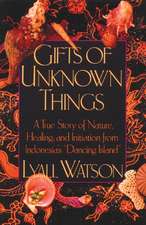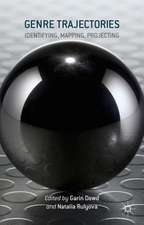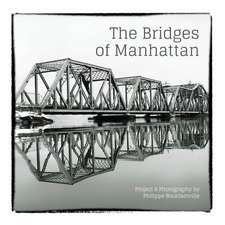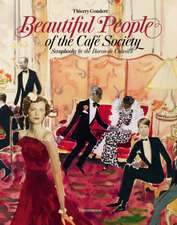Leos Carax: French Film Directors Series
Autor Fergus Daly, Garin Dowden Limba Engleză Paperback – 23 oct 2003
Din seria French Film Directors Series
-
 Preț: 125.56 lei
Preț: 125.56 lei -
 Preț: 115.53 lei
Preț: 115.53 lei -
 Preț: 211.28 lei
Preț: 211.28 lei - 23%
 Preț: 718.35 lei
Preț: 718.35 lei -
 Preț: 153.70 lei
Preț: 153.70 lei -
 Preț: 123.68 lei
Preț: 123.68 lei -
 Preț: 205.09 lei
Preț: 205.09 lei -
 Preț: 169.16 lei
Preț: 169.16 lei -
 Preț: 177.23 lei
Preț: 177.23 lei -
 Preț: 146.80 lei
Preț: 146.80 lei -
 Preț: 171.07 lei
Preț: 171.07 lei -
 Preț: 221.49 lei
Preț: 221.49 lei -
 Preț: 194.29 lei
Preț: 194.29 lei -
 Preț: 218.05 lei
Preț: 218.05 lei -
 Preț: 217.08 lei
Preț: 217.08 lei -
 Preț: 184.64 lei
Preț: 184.64 lei -
 Preț: 205.68 lei
Preț: 205.68 lei -
 Preț: 221.88 lei
Preț: 221.88 lei -
 Preț: 217.62 lei
Preț: 217.62 lei -
 Preț: 234.79 lei
Preț: 234.79 lei -
 Preț: 339.10 lei
Preț: 339.10 lei -
 Preț: 168.17 lei
Preț: 168.17 lei -
 Preț: 220.13 lei
Preț: 220.13 lei -
 Preț: 218.61 lei
Preț: 218.61 lei -
 Preț: 218.81 lei
Preț: 218.81 lei -
 Preț: 169.53 lei
Preț: 169.53 lei -
 Preț: 167.03 lei
Preț: 167.03 lei -
 Preț: 218.05 lei
Preț: 218.05 lei -
 Preț: 203.84 lei
Preț: 203.84 lei - 23%
 Preț: 716.46 lei
Preț: 716.46 lei -
 Preț: 217.08 lei
Preț: 217.08 lei -
 Preț: 217.84 lei
Preț: 217.84 lei - 23%
 Preț: 716.42 lei
Preț: 716.42 lei -
 Preț: 172.25 lei
Preț: 172.25 lei -
 Preț: 217.93 lei
Preț: 217.93 lei
Preț: 170.30 lei
Nou
32.59€ • 35.39$ • 27.38£
Carte tipărită la comandă
Livrare economică 23 aprilie-07 mai
Specificații
ISBN-10: 0719063159
Pagini: 200
Ilustrații: 1, black & white illustrations
Dimensiuni: 154 x 204 x 11 mm
Greutate: 0.22 kg
Ediția:New.
Editura: MANCHESTER UNIVERSITY PRESS
Seria French Film Directors Series
Descriere
"Leos Carax" is a study of the films of this popular "enfant terrible" of contemporary French cinema. The key ingredients and influences of Carax's four films (including "Les Amants du Pont Neuf" and "Pola X") are examined here: Paris, pop music, flanerie and amour fou, mannerist and neo-baroque aesthetics, the "Nouvelle Vague" and contemporary naturalist cinema. The authors draw on a variety of intellectual sources, from Deleuze's philosophy of Cahiers-based film criticism to theories of art and literature, in order to disentangle the complex web of biographical mythology, formal and intellectual cinematic concerns, flamboyant imagery and intertextual references woven by Carax and his films in the last two decades of the 20th century. Daly and Dowd argue that critical instincts seeking the key to the visionary poetics of Carax's cinema can most profitably directed towards the recent history of maverick mannerist and baroque auteurs. From Ruiz and Rivette to Garrel and Techine, and their explorations of the "powers of the false", rather than Godard or the "cinema du look" fraternity of Besson and Beineix. Part of the "French Film Directors" series, this text should be of use to all fans and scholars of contemporary French cinema.
